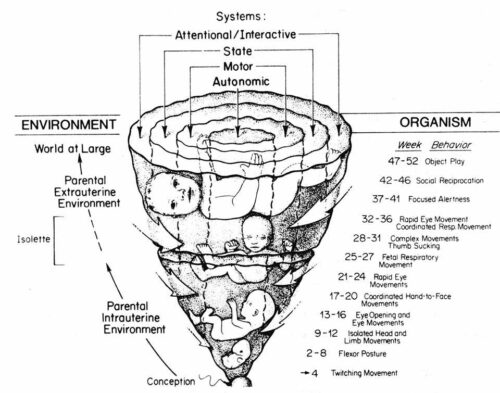
The Newborn Individualized Developmental Care and Assessment Program focuses on each infant’s behavioral cues in order to enhance that infant’s strengths and diminish the infant’s vulnerabilities. The infant’s family is understood as the infant’s most important nurturer and anchor, i.e. the infant’s closest environment, on the path to competent development, and as such integrated in all care from the infant’s birth on throughout the infant’s hospitalization.
The Synactive Theory describes the infant in constant interaction with the environment from within the womb to the newborn intensive care nursery and the caregiving family’s support in the nursery setting, to the family in their home. Newborn infants are understood as actively striving for their next steps in development, while depending upon “good enough” environments and care to assure progress on their developmental trajectory.
The Synactive Theory of Development has been and continues to be instrumental in guiding range of newborn intensive care professionals, including neonatologist, nurses, psychologists, neurologists as well as developmental specialists, therapists, such as physical and occupational therapists, lactation consultants, speech and language therapists, respiratory therapists, and researchers in their understanding of the often very small steps in development that prematurely born and other high risk infants attempt to accomplish, which however are major steps for the immature or traumatized brain.
The Synactive Theory gives professionals the framework and tools with which to identify the stepwise and often difficult to achieve components of such infants’ accomplishments that appear simple and self-understood for healthy fullterm newborns and infants, such as steady breathing, robust sucking, efficient swallowing, smooth digestion; perhaps while also gazing at their parent or caregiver.
| Cookie | Duration | Description |
|---|---|---|
| cookielawinfo-checbox-analytics | 11 months | This cookie is set by GDPR Cookie Consent plugin. The cookie is used to store the user consent for the cookies in the category "Analytics". |
| cookielawinfo-checbox-functional | 11 months | The cookie is set by GDPR cookie consent to record the user consent for the cookies in the category "Functional". |
| cookielawinfo-checbox-others | 11 months | This cookie is set by GDPR Cookie Consent plugin. The cookie is used to store the user consent for the cookies in the category "Other. |
| cookielawinfo-checkbox-necessary | 11 months | This cookie is set by GDPR Cookie Consent plugin. The cookies is used to store the user consent for the cookies in the category "Necessary". |
| cookielawinfo-checkbox-performance | 11 months | This cookie is set by GDPR Cookie Consent plugin. The cookie is used to store the user consent for the cookies in the category "Performance". |
| viewed_cookie_policy | 11 months | The cookie is set by the GDPR Cookie Consent plugin and is used to store whether or not user has consented to the use of cookies. It does not store any personal data. |
